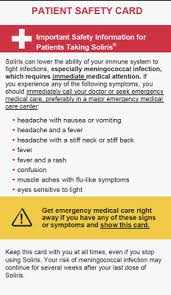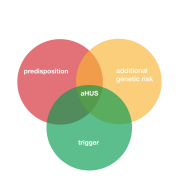Update news on switching process.
aHUS alliance Global Action were not aware of a prior step in the switching process to the one appearing on NRCTC’s website. It now appears that under shared care the decision to switch , or not, will be made jointly by local and NRCTC clinicians. Following that patients on eculizumab will be offered a joint consultation to discuss the recommendation. (See updated protocol summary below.)
In England there is shared care between the NRCTC and the local clinicians. All local clinicians were written to in September by their NRCTC consultant to arrange a call to discuss our joint patients. A personalised recommendation was/will then be made and the patients offered joint consultations with the local team/NRCTC to discuss the data for Ravulizumab and the pros and cons. There are certain specialised situations whether a switch to Ravulizumab would be inappropriate.
In the research report by the aHUS alliance Global Action about the experience and perception of patients converting from eculizumab to ravulizumab ( see Article No. 384 for copy of report) patients regarded the logistics of the transition as not too problematical. But if things could go wrong it is possible they would.
In all instances the logistics were managed by the same hospital in liaison with Alexion and Insurance Companies.
In the UK, ravulizumab was approved by NICE for the treatment of aHUS in June. It is now time for the patients who have been on eculizumab to transfer to ravulizumab.
In England care of aHUS patients is shared between the patient’s home hospital and an aHUS Centre in Newcastle upon Tyne. The latter advises and approves funding. The Centre has recently issued an explanation of how the switching is to be done . A copy of the protocol has been published on the aHUS Centre’s website (see at this link HERE) . It includes a simple to follow flow chart of the process which can be viewed at this link HERE.
The process sequence is basically:
- all clinicians in England with aHUS patients were contacted about ravulizumab in September;
- it is the local clinician’s responsibility to arrange a meeting with NRCTC to discuss each patient;
- Local clinicians and NRCTC clinicians will jointly decide whether or not to switch each patient;
- Once decision made each patient will be offered a joint consultation about the recommendation for them
- the local clinician informs the NRCTC about the planned start date for each patient;
- the clinician must issue a new meningococcal vaccination certificate for ravulizumab after the last dose of eculizumab has been administered – Alexion will not fulfil any order for ravulizumab without it;
- having already alerted the local hospital Pharmacist of a potential change of prescription, a funding request form is sent by the Pharmacist using the usual “blueteq” NHS procedure for high cost drugs;.
- the aHUS Centre signs their part of “blueteq” document to approves the funding and confirm that the drug will be paid for centrally and not by the hospital;
- the first loading ravulizumab dose is to be administered in hospital two weeks after the last eculizumab infusion. the patient is to be observed for one hour;
- the first maintenance ravulizumab dose happens two weeks later in hospital or by home care;
- the third maintenance ravulizumab doses follows in eight weeks ( 4 weeks for children) and the eight ( or 4) weekly cycles continue.
All communication with the patient about the drug switch is done by the patient’s own local clinician. If patients have not heard about plans for a switch it might be worth e mailing their clinician as they may not yet be aware of the above protocol. A suitable date for the last eculizumab dose needs to be agreed. The hospital infusion unit will need to ready to receive the patient with ravulizumab already supplied to the ward/clinic by the hospital pharmacist .
Apart from the quality of life improvement for patients it is in the financial interest of the NHS to facilitate the switch as soon as possible but there well over hundred aHUS patients on eculizumab in England at any time, so it will take some time to arrange both the decision meetings and the patient consultations.
Article No. 464


